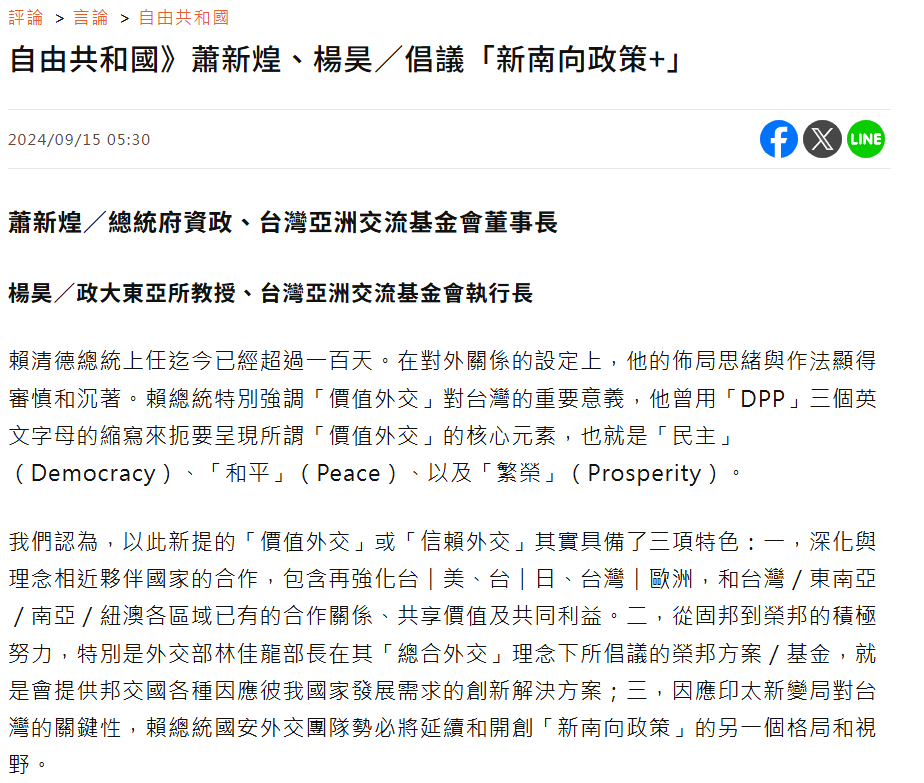Since President Lai Ching-te took office over 100 days ago, his approach to foreign relations has demonstrated careful planning and composure. President Lai places particular emphasis on the importance of "values-based diplomacy" for Taiwan. He uses the acronym "DPP" to concisely encapsulate the core elements of "values-based diplomacy," which are "Democracy," "Peace," and "Prosperity."
We believe that this newly proposed "value-based diplomacy" or "trust diplomacy" possesses three key features: First, deepening cooperation with like-minded partner nations, including further strengthening Taiwan-U.S., Taiwan-Japan, Taiwan-Europe relations, as well as existing partnerships with regions such as Southeast Asia, South Asia, and Oceania, based on shared values and common interests. Second, actively transitioning from maintaining diplomatic ties to enhancing them. Under Foreign Minister Lin Chia-lung's concept of "comprehensive diplomacy," the proposed "Prosperity Plan/Fund" provides innovative solutions tailored to meet the development needs of Taiwan and its allies. Third, addressing the evolving dynamics of the Indo-Pacific region, with President Lai's national security and foreign affairs team expected to continue and innovate upon the "New Southbound Policy," creating a new framework and vision.
The continuation and innovation of the "New Southbound Policy" have become a focal point of inquiry among regional partner nations. Before taking office, President Lai had repeatedly stated his intention to continue the "New Southbound Policy." Over the past eight years, this policy has delivered significant achievements as a concrete response to the changing Indo-Pacific landscape. President Lai has also agreed to promote an innovative "enhanced New Southbound Policy," which may be referred to as "New Southbound Policy+."
We advocate that this "+" aligns with President Lai's core objective of values-based diplomacy, while further strengthening the three key pillars that have underpinned the New Southbound Policy since its inception: "Development" as the agenda, "People" at the center, and "Partnership" in practice. In addition to building on eight years of successful efforts, President Lai’s "New Southbound Policy+" is expected to bring even more initiatives that leverage Taiwan’s role as an indispensable global partner.
A thorough review reveals that these strengths and achievements encompass key areas emphasized by the government, including high-tech supply chain security, digital solutions, healthcare and public health, as well as resilience and disaster prevention. Moreover, the recently emphasized "economic, trade, and technology diplomacy" will naturally apply to friendly nations under the New Southbound Policy. In addition, civil society and NGOs have significant potential to expand and advance on the existing foundation in response to the "New Southbound Policy+." Key areas for further development include think tank exchanges and collaboration, youth leadership exchanges, and NGO training and cooperation.
Over the years, the Taiwan-Asia Exchange Foundation has served as a think tank for Taiwan's New Southbound Policy. We believe that President Lai's "New Southbound Policy+" not only builds on a successful foundation but also introduces bold and innovative breakthroughs. The construction of six New Southbound corridors/strategies serves as the pioneering framework for "New Southbound Policy+."
This includes three corridors/strategies already proposed by the government: the NSP Semiconductor and Digital Technology Corridor, aimed at providing innovative solutions and building resilient supply chains; the transformation and expansion of the Ministry of Health and Welfare's existing "One Country, Multiple Centers" program into the NSP Health Corridor; and the NSP Resilience Corridor, which focuses on enhancing disaster prevention management and disaster resilience.
As for the non-governmental sector, initiatives could be led by civil society, targeting the expansion of regional think tank dialogue and collaboration through the New Southbound Think Tank Corridor. Other initiatives include establishing Taiwan as an NGO training hub through the NSP NGO Corridor and fostering the development of a new generation of Asian talent through the NSP Youth Corridor. The content embodied in the six "New Southbound Policy+" corridors/strategies aligns with the aforementioned two types of DPP values.
Through this initiative, the "New Southbound Policy+" will further demonstrate not only “Taiwan can help” but also “Taiwan can lead” on the global stage. It will advance value-based diplomacy and bolster President Lai's campaign vision of an "everlasting economic and trade nation."
Additionally, Taiwan's "New Southbound Policy+" can complement and enrich the various Indo-Pacific strategies proposed by countries such as the U.S., U.K., EU, Japan, Australia, India, and European nations like Lithuania, the Czech Republic, and France.
Original Text: https://talk.ltn.com.tw/articl...
